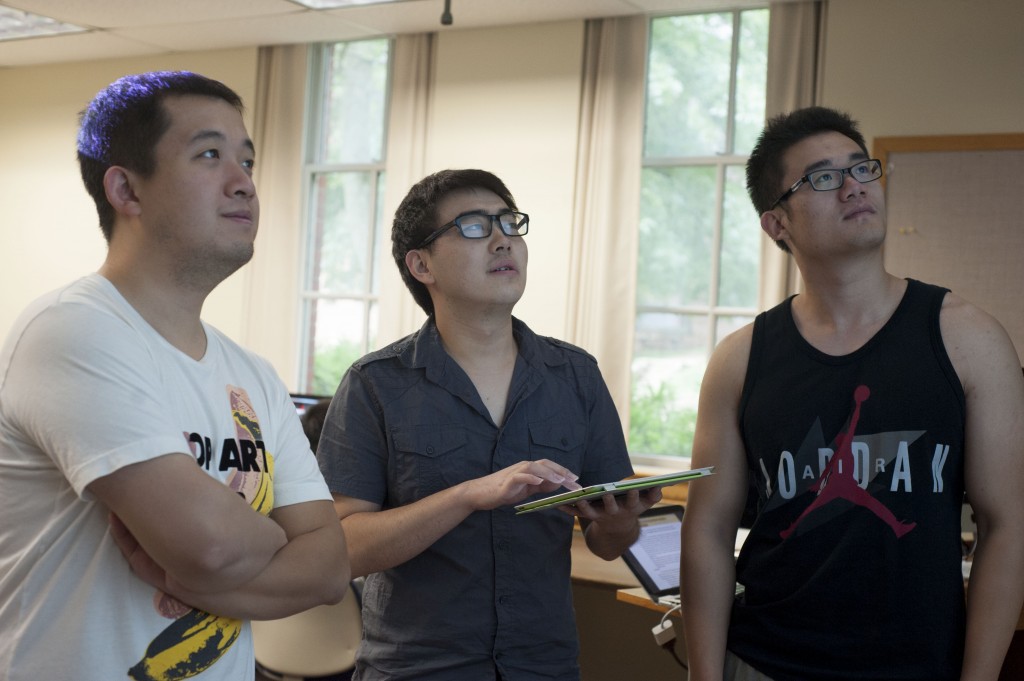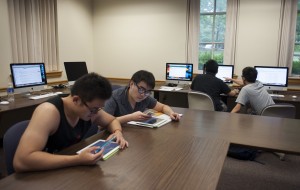by Lydia Deakin
Linguistics Department, ELIP TA

ENG 1610 students discuss revisions to their writing project using their iBooks.
Unbeknownst to many on campus, something new, innovative, and exciting is happening in Gordy Hall: a freshman composition course for multilingual students in business is being taught through the use of an iBook.
Customized iBook Offers Increased Interactivity
This new technology is not simply replacing a paper-based textbook, but rather it houses the bulk of the materials that the students need for the course, including readings, practice activities, the syllabus and assignment sheets, and it even serves as a medium for visual aids during student presentations. In addition to the iBook, the class takes place in a digital media lab, resulting in a truly multi-modal classroom, where students can engage with each other and the instructor, as well as access an entire world of information, through the use of technology.
Elliott Casal, a recent graduate of Ohio University’s Applied Linguistics M.A. program, worked as the project team leader in creating the iBook for the business section of ENG 1610, Freshman Composition: Writing and Rhetoric. The course is overseen by the English Language Improvement Program (ELIP) in the Department of Linguistics. The iBook itself is more than just a textbook made digital; it is full of interactive and engaging activities, links to readings, videos, and other forms of hyper-textual media that bring a new depth to the students’ learning experience.

The students themselves, each of whom can borrow an iPad from the Language Resource Center to take home and use for the duration of the course, enjoy this new form of textbook for several reasons, including its convenience, ease of use, and the “fun” aspect of having a new gadget to “play” with as they learn. However, there is more than just the “novelty” effect to this use of technology in the classroom.
The iBook not only supports individual learning through the embedded activities that students complete at home and on their own time, but also supports collaborative learning. As students read in the iBook, they can take notes that can be submitted through embedded Google forms, which can then be brought into the classroom for class discussions about writing. The iBook also includes engaging media, like videos, that they say breaks up the monotony of reading a textbook.
Project-Based Learning + Local Businesses = Real-World Experience
This course is also different from many other university courses in that it is a collaborative project-based class, meaning students work together on group projects to complete writing assignments that require them to engage with the Athens community. Currently, these projects require the groups to each focus on one aspect of the business model of a local business and complete several business writing tasks throughout the semester. This requires the students to work together closely with their group members, and many use features of the iPads in order to keep in contact with each other outside of the classroom as well as to collaborate on tasks such as gathering and presenting survey information.

Students can collect and collaboratively analyze data using their course iBooks
Additionally, students work together and collaborate on in-class writing assignments and other classroom activities through the use of this technology. They use the AirServer on the iPad to make presentations in front of the class directly from their hands to the screen, which puts a new spin on class presentations and gives the presenter more control of his or her presentation, a feature that students say they like. Also with the AirServer, students can project their own writing projects up onto the large screen in order to better facilitate group discussions during peer review activities. Rather than huddling around a single small computer screen or sheet of paper, the students can more dynamically discuss their work.
For More Information
ENG 1610 for Business students is offered every semester including summer. Visit English Language Improvement Program (ELIP).




















Comments